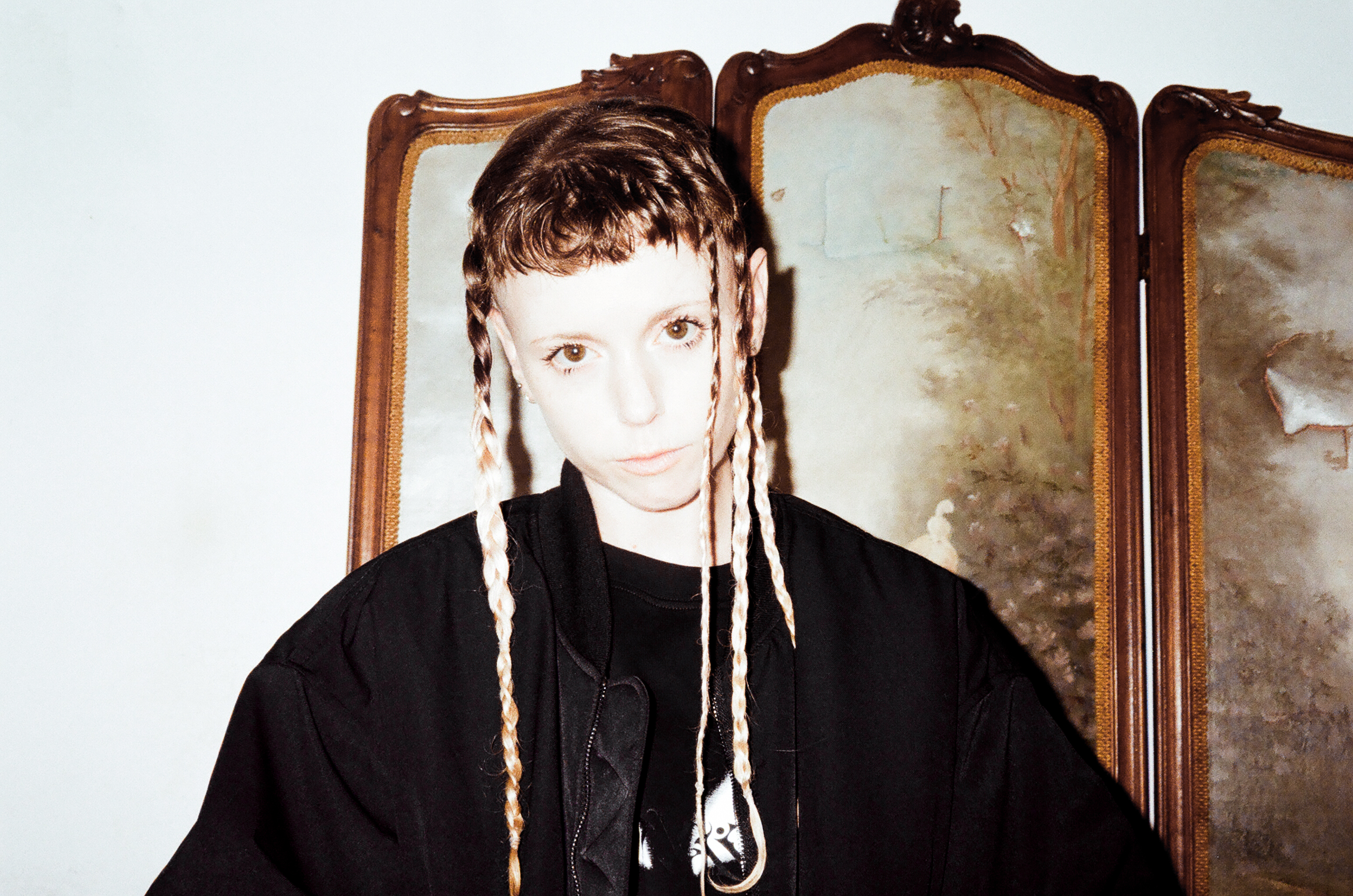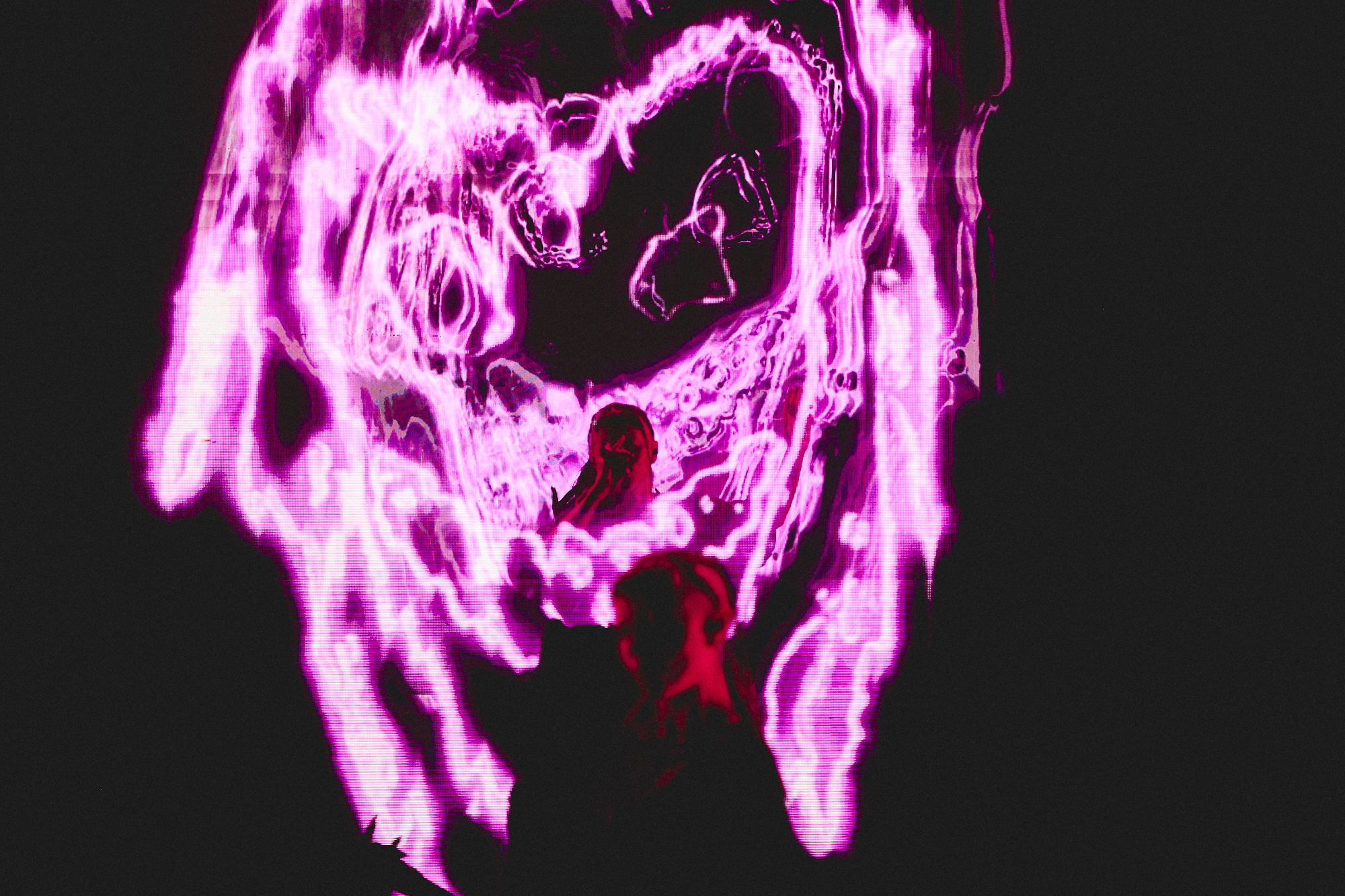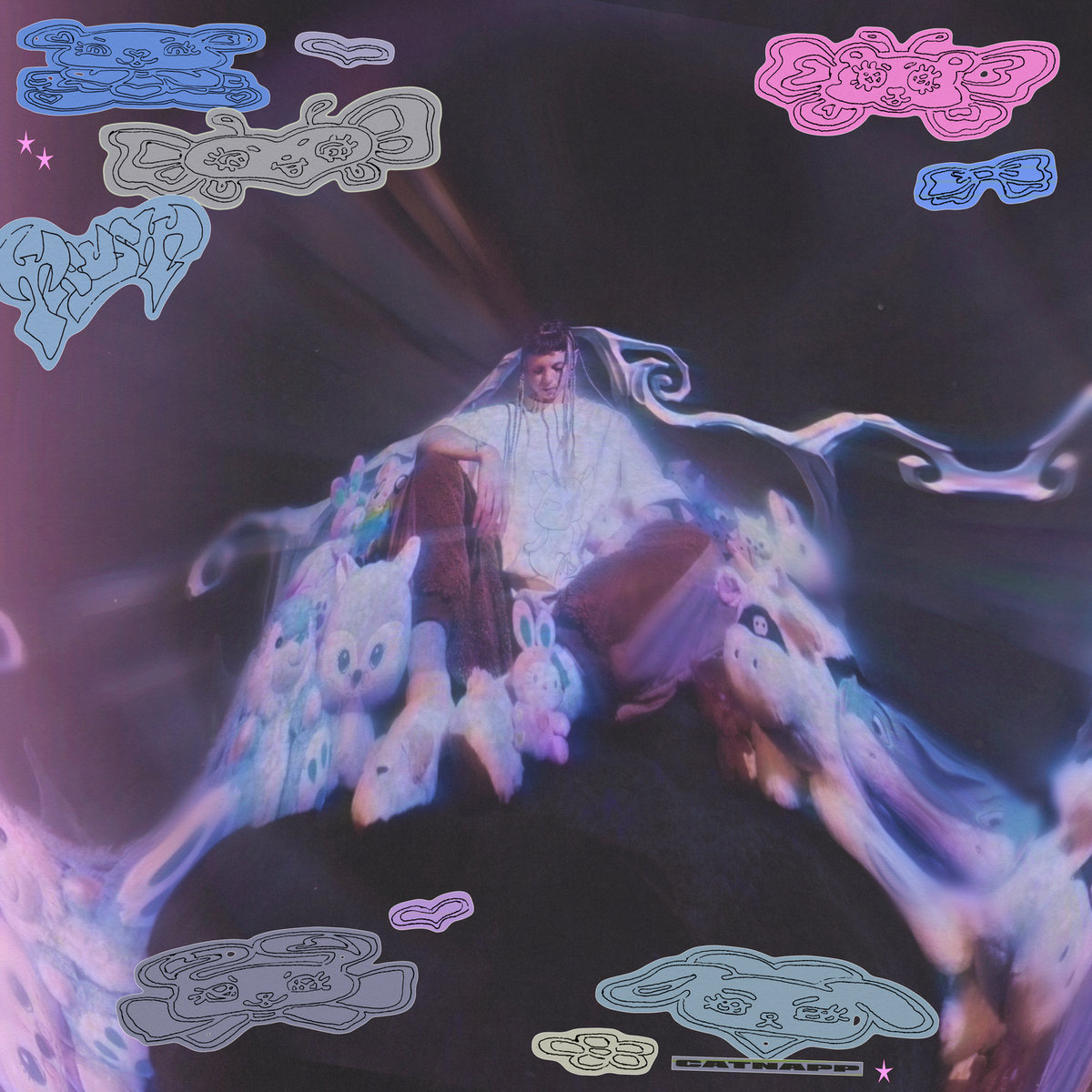CATNAPP: ON THE LUMINOSITY OF EXTREMES AND INTUITION
(para leer en español, suscríbase aquí para recibir un correo exclusivo con un enlace a la entrevista.)

Image by Juan Bermejo
Interview and Text by Iberia Muñoz | 12.07.2022
In a world of dichotomic polarities, is it possible to find an intersection between innocence and violence, tenderness and darkness? For Amparo Battaglia, the Berlin-based Argentinian producer behind Catnapp and founder of NAPP records, the answer is yes. In her musical cosmos, these two essences do not operate as opposites, but as two equally powerful forces that collide, mix and, ultimately, reconcile into a luminous whole.
Catnapp’s latest album TRUST (Monkeytown Records) is proof that extremes can also become a territory for organic play and self-discovery. Battaglia’s work is inspired by the ages of childhood and adolescence, two ages in which, according to Battaglia herself, our vulnerable side intertwines with certain destructiveness. As a result, her music juxtaposes tender melodies with upfront, provocative lyrics or soft ambiences that clash with fiery, stomping beats.
TRUST is also an exercise of self-belief: in the face of algorithmic, capitalist logic, Battaglia has decided to keep favoring intuition above perfection, freedom above the constraint of any hermetic form. This is not only about letting go of control, but also about trusting an intimate vision and its potential to build its own destiny.
Keep reading to find out more about Battaglia’s musical ethos, her origins as a producer and the value of error in creation.
︎
Hi, Amparo! It’s a pleasure talking to you, now that there are so many exciting things happening all around you. You launched your new album TRUST a few weeks ago and the album’s tour is about to begin. That’s why I’d like to begin by asking: what does this album represent in your career as an artist and in your personal narrative? What are the things you welcome and leave behind with TRUST?
Above all, I think TRUST reasserts the freedom I have to be genuine and sincere through my music, which is something that I’m very thankful for. It’s like an intimate diary, full of confessions, complaints and desires. It’s for others, for the person I think I am and also for who I’d like to be and even who I once was. In Spanish, TRUST could mean trusting others but also having trust in yourself. And I chose the name thinking about both meanings. At the beginning of an album I usually have no idea what I want to do beforehand, and if I have one it usually doesn’t work and I end up going another way. Generally speaking, concepts, ideas and plans come from the head. And by the moment I sit down to compose music, emotions overpower the brain. It wasn’t until I finished the album that I finally understood what the album was truly about: 90% of the songs talk about trust and distrust. About letting yourself be carried away by instinct. In that sense, TRUST also means learning to trust myself.

Image by Juan Bermejo
I feel like TRUST has a very clear narrative. Like a wave, the songs fluctuate in a harmonious way, they come from a torrential energy and then move into a smooth and melancholic tone. Did you follow a common thread to give TRUST that coherence?
Just as I don’t have ideas or concepts, I also don’t follow a thread or look for a common sense between the songs. I make one song after another one, independently. It’s the songs themselves which find their own place in the album.
Even though I’m sure that you have a meaningful relationship with each of the album’s songs, I’d still like to ask: Is there any song that has a special meaning for you or is there any story behind a song that you’d like to share?
I’d have to choose “mess it up.” Maybe some people think that my life is all about touring, making music, talking to people and being very “fragmented”, so to speak. But the truth is that I spend most of my time answering emails, organizing and preparing for the next step. I wake up at 8 AM every day and go to bed at 10 PM. I have to be very organized and responsible for this job. Sometimes there are so many contracts, concepts, designs, decisions and responsibilities, and “mess it up” speaks about breaking free from that routine and sending everything to hell.
Can you tell us a bit more about the album’s art?
I didn’t want to show my face in the cover, because the songs don’t have anything to do with my face. And honestly I don’t think that the most important thing in this album is a face. Yes, I make the music, but it’s not my face that I’m interested in showing to people who buy the album. On top of that, I’m really tired of having to conform to an algorithm that decides what sells and what doesn’t.
In the picture you can see a kind of bed where I’m sitting along with some stuffed animals. We could say it’s a teen’s room, but in the middle of a dreamlike reality. I think that in some ways Catnapp is still a little girl. So the place in the cover is similar to the place I sit in whenever I make music, and I wanted to show listeners the song’s main source. Somewhere I read that artists who start very young get stuck in that age and never grow up.
The album art was done jointly by artist Kristyna Kulikova, illustrations by Silemario, logos by Rokenroller, photography by Kitty Schumacher, CGI by Maxi Galgenmeier and styling by Catt.
Almost twenty dates are on the way for TRUST’s tour. Considering the rhythm that these live shows demand, how do you prepare for a concert and how do you care for your spirit during these demanding journeys?
I make sure I have time to rest before and after. I went on tours without having this in mind and almost every time I ended up sick or having some kind of breakdown. If you look at my calendar, almost 30% of the time has to be dedicated to rest.
I’d love to know how you enter the headspace that allows you to be creative. Do you have any special rituals that make you feel ready to compose a song? Do you wait for inspiration to come or do you actively look for it?
I’d rather let inspiration come, but this is a job and sometimes you have to look for it, haha. What I do is that I choose one free day, I prepare a big thermos of coffee and dedicate the whole day to composing. Thing is, creativity is not about pushing a button and waiting for something to happen, at least for me. Sometimes you’re just not going through a creative moment and it doesn’t matter how hard you push because it won’t happen. And forcing something that should be pleasurable might lead to resistance or rejection the next time I approach the studio.
I think it’s important to respect the moments when it’s not working or I’m not feeling like it, and just leave it for another day. However, if I have to do something because my work demands it, I try not to criticize myself too much and just let it be.
I saw the video you made for Ableton and I really think you are good at explaining the process behind composing a single song step by step. I was happy to see that people in the comment section feel the same way. Can you tell us about your first approach in music production?
I studied music production in Argentina. I must confess I like teaching a lot, but it’s been so long since I attended my classes that now I realize I’m missing a lot of technical vocabulary, haha. The guys at Ableton had to help me name some things that I usually call the “thingy.”

Image by Toto Pons
Is there something that you would’ve liked to know at the beginning of your training as a producer?
I would’ve liked to listen to my mother and go deeper into my studies in mastering, mixing and many other things. But when I finished my degree I was working full time and I didn’t have much time for myself, so I had to choose between studying and producing and playing gigs. I was really anxious to play so I made my choice.
Speaking about origins, how did you learn to transform frustration or error into creation? What is the biggest surprise that an error has gifted you?
Frustration actually makes it easier for me to produce music. I mean, talking about experiences in life, feeling frustrated, angry or sad is what inspires me the most when I produce. Give me a happy year and I won’t make a single song, but put a little splinter in my heart and I’ll give you a double album.
Now, speaking technically, I don’t think there’s such a thing as “error” when it comes to art. Those “mistakes” are part of a journey or process. Producing is like “choose your own adventure.” For example, maybe you wanted to set that synthesizer to a specific octave, but you got confused, recorded it an octave higher and at the end you liked the octave you chose by “mistake” and decided to go with it. I think the key is in letting yourself flow and not judging yourself too much at the time when things don’t go out as we planned.
In my opinion, your music has a very clear contrast between innocence and violence. Even TRUST’s art has this characteristic: you appear surrounded by stuffed animals, but in the video “time on me” you have the name of the album engraved in your skull, resembling a wound. Do you actively look for this contrast between tenderness and darkness when you compose music? In what way do these polarities relate to you?
I think that Catnapp is just organically like that. Musically, it is easy for me to reach those extremes. If I think about it, I go back to the theme of adolescence, which is an age of polarities. There are moments when you’re still a 12 year old girl and other moments when you are a demon that wants to go out and drink vodka on the street with strangers at 4 in the morning.
What role do lyrics play in your music? Do you improvise, going after the word's texture or do you build the lyrics with a specific situation in mind?
Lyrics are actually very hard for me, because they are very personal and the thing that connects me the most with listeners. They tend to be the last thing I do.
Sometimes I have a vague idea about someone or something I want to write about. Usually lyrics won’t come out if I don’t have that somebody or something really clear in my head. If I have that, then I can move on and develop a story.
I read in your interview for SHAPE that you’d like to make music for science fiction films. What is your relationship with this genre and what aspects of your music are compatible with it?
I don’t know if science fiction is related to my music as Catnapp. I like them separately. I’ve been a science fiction fan since I was little. It’s the only thing I read. I love when a scene in a film is enhanced by music. A scene or a film might be good, but if there’s good music it’s 3984 times better. In this aspect, one of my recent favorite films was Annihilation.
Finally, is there something you’d like to learn in the future? It might be music related or not.
Yes, I would love to be a coach for other artists. To use what I learned in my career, study some psychology and be able to turn all that into accompanying those who are entering this world that can be quite difficult but actually has a lot of potential to be exciting and fun.
BUY THE ALBUM VIA https://www.monkeytownrecords.com/releases/trust/

Image by Kitty Schumacher

